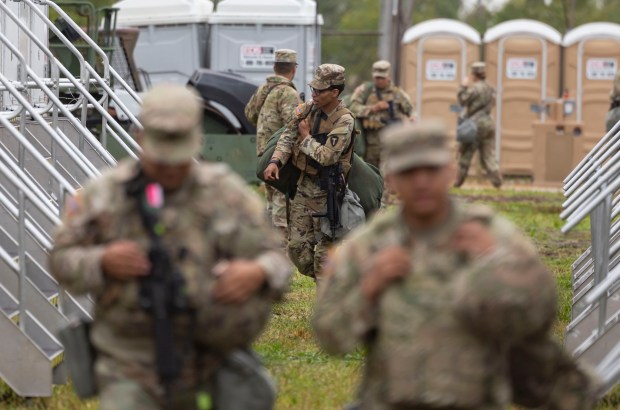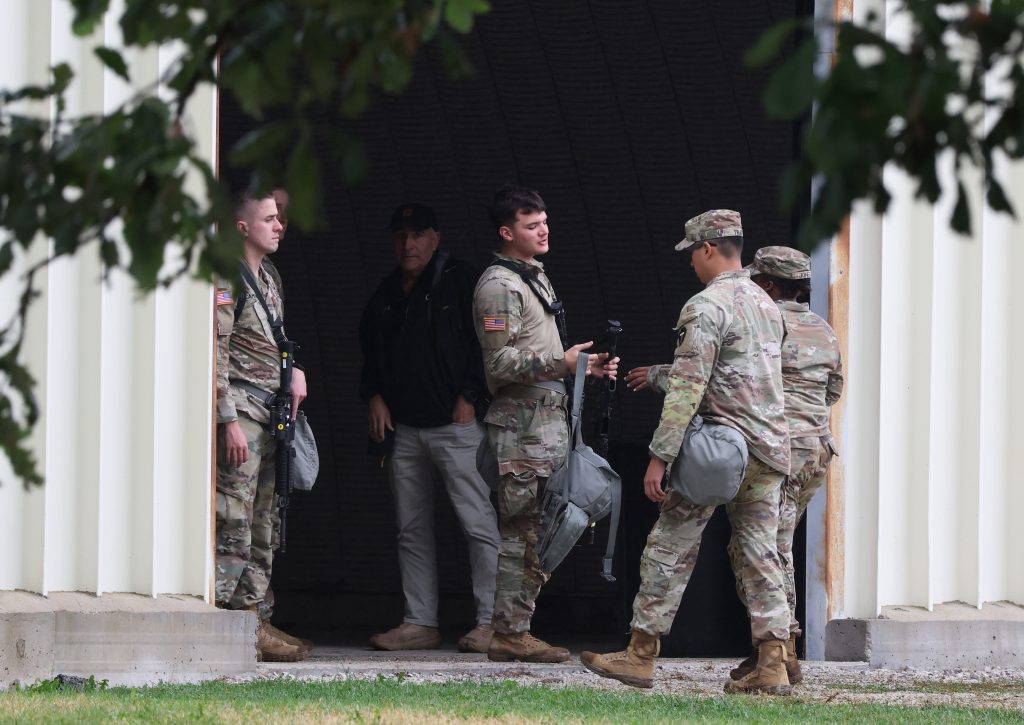Calling the recent court ban on National Guard deployment in Illinois part of a “disturbing and recurring pattern,” the Trump administration on Friday asked the U.S. Supreme Court to allow the president to dispatch troops in the Chicago area pending appeal, escalating the president’s conflict with Democratic governors over using the military on U.S. soil.
The temporary restraining order entered last week by U.S. District Judge April Perry “improperly impinges on the President’s authority and needlessly endangers federal personnel and property,” the solicitor general said in its petition asking the high court to stay Perry’s order while the case plays out in the courts.
The 43-page petition also asked for an immediate administrative stay “given the pressing risk of violence,” but the court had taken no action on that as of 5 p.m. Friday.
The filing said Illinois’ resistance to a National Guard deployment mirrors similar actions still unfolding in California and Oregon. It asked that President Donald Trump be allowed to deploy some 700 troops in Illinois — 300 from the Illinois National Guard and another 400 federalized out of Texas earlier this month.
The Supreme Court asked lawyers for Illinois to respond by 5 p.m. Eastern time on Monday.
In response to the administration’s appeal, Illinois Gov. JB Pritzker wrote in a social media post Friday that the president “will keep trying to invade Illinois with troops — and we will keep defending the sovereignty of our state.”
“Militarizing our communities against their will is not only un-American but also leads us down a dangerous path for our democracy,” Pritzker wrote. “What will come next?”
The petition comes just a day after the 7th Circuit U.S. Court of Appeals declined to grant a stay to Perry’s order, ruling her findings were not “clearly erroneous” and that “the facts do not justify” Trump’s actions in Illinois.
The three-judge appellate panel unanimously agreed with Perry that, even giving the president “great deference” when it comes to his power to call up the military, there was no evidence that he needed troops to help enforce immigration law or quell any kind of organized rebellion.
“The spirited, sustained, and occasionally violent actions of demonstrators in protest of the federal government immigration policies and actions, without more, does not give rise to a danger of rebellion against the government’s authority,” stated the opinion by Judges Ilana Rovner, David Hamilton and Amy St. Eve.
The judges went on to note that while the Trump administration has claimed that protesters and local politicians are hampering immigration-enforcement efforts, the evidence — and even the administration’s own statements — don’t back that up.
Two of the three judges on the panel, Rovner and St. Eve, were appointed to the 7th Circuit by Republican presidents, with St. Eve’s appointment coming during Trump’s first term. Hamilton was appointed by Democrat Bill Clinton.
Federal facilities, including the processing facility in Broadview that’s become a flashpoint for protests, have remained open, and while there has been some violence it was quickly contained, the panel wrote.
“At the same time, immigration arrests and deportations have proceeded apace in Illinois over the past year, and the administration has been proclaiming the success of its current efforts to enforce immigration laws in the Chicago area,” the opinion stated. “The administration accordingly is also unlikely to succeed on this argument.”
 Members of the Texas National Guard arrive on Oct. 7, 2025, at the Army Reserve Training Center in Elwood. (Brian Cassella/Chicago Tribune)
Members of the Texas National Guard arrive on Oct. 7, 2025, at the Army Reserve Training Center in Elwood. (Brian Cassella/Chicago Tribune)
The Trump administration’s appeal to the Supreme Court, however, said “federal personnel and federal property are the central targets of the violence that has roiled the Chicago area in recent weeks.”
The filing relied on many of the same declarations from immigration officials that were put into the record before Perry, including allegations that organized protesters had formed convoys and intentionally rammed agents’ vehicles during enforcement operations, that rioters had shot fireworks and thrown rocks at officers, and that a “high-ranking” Chicago gang member was charged with putting a $10,000 bounty out for the killing of Border Protection Cmdr. Gregory Bovino.
“An immediate administrative stay would allow the Armed Forces to provide the protection that the President has directed,” the petition concluded. “Were the injunction allowed to remain in effect, even just for the period while this Court considers the stay application, that would immediately increase the risk that federal personnel in Chicago may be seriously harmed by violent anti-ICE agitators.”
While some of those cases have since fallen apart in court, including one instance where a federal grand jury refused to indict a Chicago couple accused of assaulting officers during a protest in Broadview, the solicitor general argued that it’s hardly surprising given the “current climate of hostility” toward federal law enforcement in Chicago.
“A grand jury’s decision not to indict a person accused of assaulting a federal officer is hardly proof the assault did not occur,” the filing stated.
During the hearing before Perry on Oct. 9, an attorney for the Department of Justice argued that protesters gearing up in gas masks and padding, “preparing for contact with federal personnel,” was evidence of the serious threat posed to law enforcement.
Perry shot back that maybe it wasn’t the protesters who started it.
“I would agree with you if it were not in evidence that ICE is indiscriminately gassing people, peaceful protesters,” the judge said. “If I were a peaceful demonstrator outside of Broadview and ICE had a habit of throwing smoke bombs at random to groups of 10 or less, I too would wear a gas mask, not because I want to do violence but because I’m trying to protect myself.”
The conservative-dominated court has handed Trump repeated victories in emergency appeals since he took office in January, after lower courts have ruled against him and often over the objection of the three liberal justices. The court has allowed Trump to ban transgender people from the military, claw back billions of dollars of congressionally approved federal spending, move aggressively against immigrants and fire the presidentially appointed leaders of independent federal agencies.
Solicitor General John Sauer wrote in Friday’s petition that the Illinois National Guard case “presents what has become a disturbing and recurring pattern” of federal law enforcement being attacked, followed by lawsuits over Trump’s decision to send in troops to defend them.
A federal judge in Oregon also has temporarily blocked the deployment of National Guard troops there. Guard troops from several states also are patrolling the nation’s capital and Memphis, Tennessee.
In a California case, a judge in September said the deployment was illegal. By that point, just 300 of the thousands of troops sent there remained and the judge did not order them to leave.
The Associated Press contributed.
Originally Published: October 17, 2025 at 3:14 PM CDT

